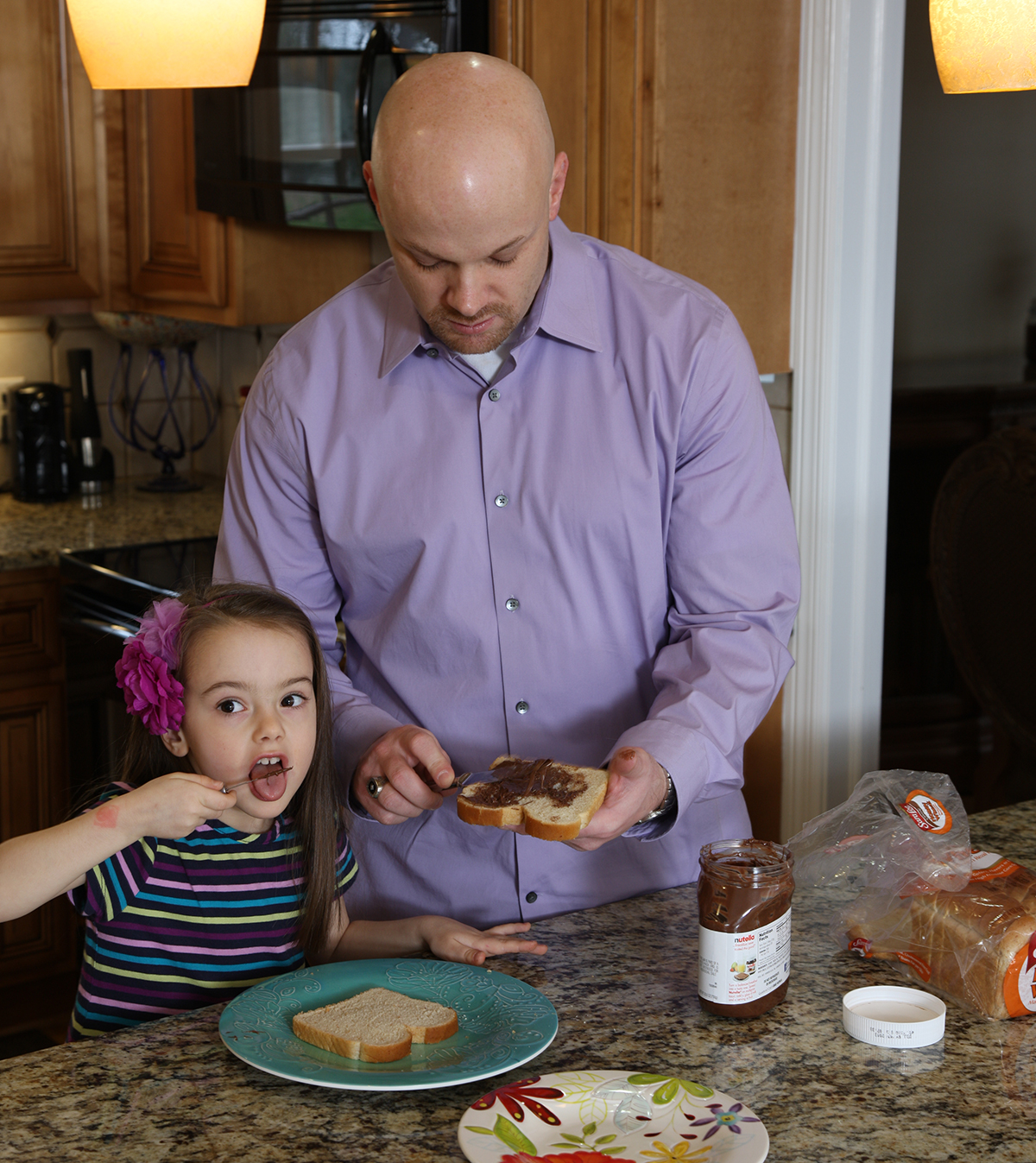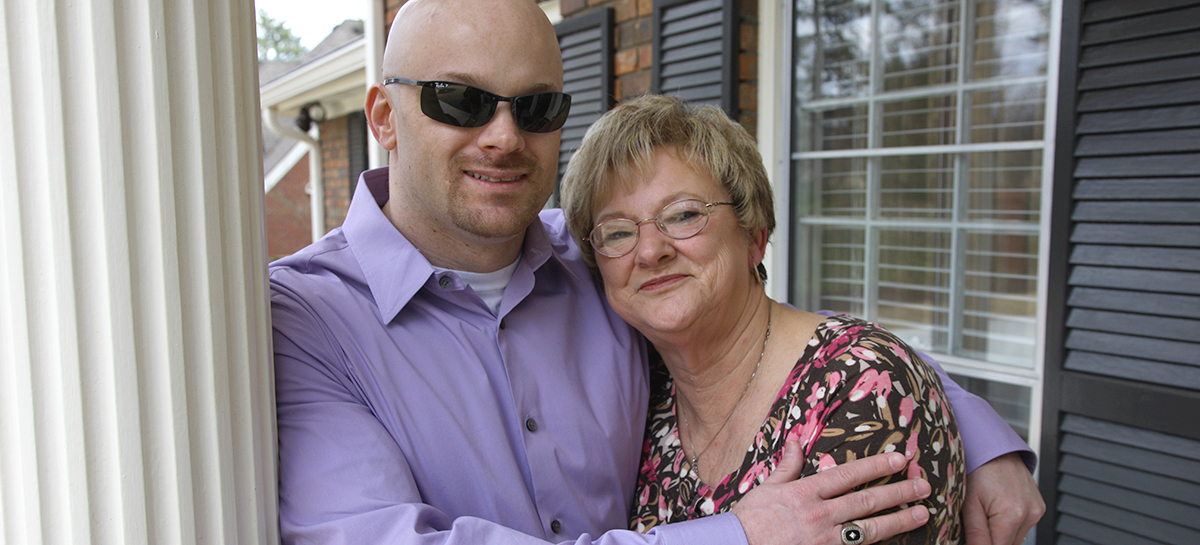In the stillness of the night, faint stars from a cutesy nightlight reflect on the bedroom ceiling and on the faces of plush animals and dolls neatly lined on wall shelves.
Tucked under a pink floral bed quilt, four-year-old Juliana presses her tiny palms together. Her fingers, with glittery polished nails, slightly clasped, hold steady just below her tightly shut eyes. With eyelashes as wispy as the spores of a dandelion, it would seem any wish could be hers.
“Dear God, my daddy’s eyes are broken. Please send doctors to fix my daddy’s eyes.”
Almost every night, she prays God will heal Chad Foster (’00), her blind almost six-foot, 200-pound father—her prince. So he could see during their playtime what a sugar plum vision she is, twirling in a too-short, soft yellow Cinderella-like dress. And in Juliana’s childlike mind of fairy tales, he’d marry her, and they’d live happily ever after.
“I’m your princess, Daddy.”
“Yes, you are, baby doll.”
Entering the world five weeks early, Juliana’s fragile body “hit me like a ton of bricks,” says Chad. “Standing over her, I could hear the voice of my parents: ‘You don’t know how worried we were about you.’”
As the tears came, “it was like a switch flipped. How on God’s earth did my parents ever do it? If Juliana had what I have, I couldn’t let her do half the things they had faith enough to let me do.”
“She would do it anyway because she’s just like her father—stubborn,” Evie, Chad’s wife, quickly pipes up, as she pats Chad’s knee in their Atlanta-area home, as if to lovingly confirm she’s right. “The minute you tell him he can’t, he will not stop until he proves you wrong.”
Monster in the closet
By the time Chad was four—Juliana’s age—nightfall was the monster in his closet.
He would wrestle with darkness to find his way to the bathroom in the middle of the night. The Halls, Tennessee, house became an obstacle course that often left its mark in bumps and bruises.
There weren’t enough nightlights or eyeglasses, says Chad’s mother, Peggy, “that would stop him from knocking something over or tripping.”
His sight was slowly being robbed by retinitis pigmentosa, a rare genetic eye disease, which no one else in Chad’s family has. The progressive, incurable disorder damages the retina, the part of the eye that functions like film in a camera, and typically makes its presence known through night blindness. Like a thief in the night, it steals patches of peripheral vision until the sliver of light left, amounting to seeing through a door’s peephole, completely closes.
“The doctors told us it wasn’t if, but when,” says Peggy. Instead of enrolling him in a school for the blind, as doctors advised, “we signed him up for soccer.”
“While he could see,” says Chad’s father, Charles, “however little that was, he was going to be a normal little boy.”
[callout]
With a black-and-blue history of emergency room visits and home remedies, Chad never really embraced the idea that one day he would not be able to see.
[/callout]
“At ages six, seven, fourteen, and sixteen, I felt ten feet tall and bulletproof,” Chad remembers.
By the time he was in high school, Chad’s superhero swagger ruled on the soccer field, basketball court, football field, and wrestling ring. The all-star athlete’s fearless heart followed him into the classroom, “when, in third grade, he boldly asked a teacher to teach him how to type,” Peggy recalls. “It wasn’t even part of his curriculum.
At sixteen, he crossed off another rite of passage—driving—even though RP stripped him of seeing at night.
“We had to let him do what he could do for as long as he could,” says Peggy, clenching her hands. “We just prayed. We worried, and then prayed some more.”
“Blind or not, I have always lived with reckless abandon,” says Chad, who is currently healing from a shattered elbow after falling during a recent neighborhood jog.
“If you never dare to be great, you will always be mediocre.”
Door to self-sufficiency
The interior walls of campus buildings; a canopy of hearty shrubbery; railings on a winding staircase—anything stationary and of magnitude became Chad’s white cane for navigating the UT campus.
Unlike high school, it did not matter how close he sat to the whiteboard in his prerequisite nursing classes. Chad, then twenty-two, could smell, but not always see, the ink of dry-erase markers. That wouldn’t be enough when he had to dissect a cadaver in an anatomy lab.
His parents were not about to let a dark cloud bury Chad’s college dreams. “They knew, and eventually I did too, that college would be my door to self-sufficiency.”

So Chad changed his major to business administration. His mind became focused on finance classes after spending the summer of 1998 studying for his exam of independence at Leader Dogs for the Blind in Rochester Hills, Michigan.
Chad spent twenty-six days in the guide dog program. After witnessing so many “who had never seen or heard, or others who were hooked up to kidney dialysis machines because diabetes took their sight,” he says, “I knew it could be worse.”
He refused to live according to what he lacked.
Chad holds hostage memories—patterns, pictures—of how the world looks (“I can remember what a blue sky on a spring morning looks like”) and operates (“I can figure out a math equation because I can still see in my mind what goes on either side of the equal sign”).
With this visual reference for life, Chad was able to maneuver from his apartment to class with Miles, his 130-pound German Shepherd guide dog.
Chad read his telephone-book-sized business management books through the eyes of his mother, who painstakingly read aloud and recorded every page.
“My mother’s sacrifice was a big part of my success.”
“I would come home from work,” says Charles, a retired car salesman, “and Peggy would be at the table reading. I would get up the next morning, and sometimes she’d still be reading.”
She would stop only if laryngitis forced her to. By 8:00 a.m. Peggy was at her bookkeeping job. She could have retired sooner, but she kept working to pay for Chad’s college expenses. Chad never settled for anything less than an A in every class.
“Chad’s only job was to finish school,” Peggy says. “I would do whatever I needed to do—that’s just a mother’s love.”
In December 2000, after six years in college, Chad proudly accepted his business degree in finance, and he never looked back.

Breaking glass ceilings
With a job lined up with management and technology consulting giant Accenture, Chad moved to Atlanta. “Miles and I learned the city’s public transit system,” he says. “I even learned how to cook.”
Peggy spent two weeks at Chad’s apartment labeling canned goods and sewing matching buttons into Chad’s suits and ties. “I would have stayed forever,” Peggy says as tears swell in her eyes, “but he didn’t need me to stay. I had done enough. He would do the rest.”
Chad taught himself how to build application programming interfaces for a screen-reading software, called JAWS for Windows, that “read” out loud what appeared on the computer screen.
Breaking glass ceilings that were seemingly off limits because he was blind, Chad has climbed the IT field ladder of success. He has been a consultant writing code, a marketing analyst, and a senior pricing analyst. He is currently a senior pricing strategist with SRA International, a global defense and IT contractor.
Working primarily from home, with frequent jaunts to SRA’s Washington DC–area headquarters, Chad spends most of his days and a lot of his nights sequestered in a minimalist office churning out multimillion-dollar bids and proposals. His framed UT degree and a dean’s list plaque are the only decor on otherwise bare walls. With headphones plugged into a fifteen-inch laptop, within arm’s reach of his sophisticated sound system (“I’ve got to have my music”), Chad listens to JAWS reciting at 123 words per minute, so fast that it sounds like gibberish to the normal ear. The program filters through more than 9,000 lines of code that Chad has written and spews out Excel spreadsheets that a seeing person would be hard pressed to understand.
He is the only person in the world who is able to integrate a high-tech customer service application with JAWS—an extraordinary feat considering that the customer relationship management model is at the epicenter of gaining and keeping customers in business enterprises like the Bank of Montreal and the Government of British Columbia. Using technology, the system synchronizes sales, marketing, customer service, and technical support. With such a specialized expertise, Chad is the force behind the doors of employment at call centers and beyond that are swinging open for the first time for thousands who are visually impaired.
No excuses
“There is nothing he can’t do,” says Evie. “I love and admire him for that. He makes no excuses for what he cannot see.”
“Daddy, are you watching me with your heart?” Juliana asks as she marches out of a pop-up castle tent.
“I sure am, pumpkin.”
This story originally appeared in Tennessee Archways magazine in summer 2013. Photos by Charlie Brooks.

